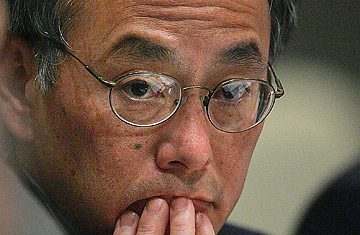
Steven Chu
To say that the environmental community is pleased with President-elect Barack Obama's newly appointed green team would be an understatement. "You see this smile on my face?" asked Paul Woods, CEO of the biofuel start-up Algenol, giving a tour last week of one of his firm's field laboratories in Florida. "It's not going away. Everyone is really excited by this."
This, of course, refers to Obama's choice of Steven Chu, the Nobel Prize–winning physicist and head of the Lawrence Berkeley National Laboratory, as the new Secretary of Energy. Obama formally introduced Chu at a press conference on Monday in Chicago; in addition to Chu, Obama named Lisa Jackson, a respected state environmental official from New Jersey, as head of the Environmental Protection Agency (EPA). Obama also created a new position for Carol Browner, who was head of the EPA under former President Bill Clinton. She'll be responsible for coordinating the Administration's work on climate change across departments — a necessary post, since global warming touches on science, the economy and politics at home and abroad. All three appointees are charged with one of the most important items on Obama's agenda: getting the U.S. off imported oil and other carbon-rich fuels. "The pursuit of a new energy economy requires a sustained, all-hands-on-deck effort," Obama said. "This time will be different. This time we cannot fail." (Read "Sewage That's Clean Enough to Drink.")
The simple fact that Obama chose officials who take the threat of climate change seriously and value the independent opinion of scientists — two qualities that were rarely in evidence among President George W. Bush's environment appointees — would have been enough to cheer greens. "It represents a 180-degree turnaround for the United States on the environment and energy policy," said Margie Alt, executive director of the nonprofit Environment America.
But each member of the new green team brings unique, and necessary, talents to the White House. Jackson, the current commissioner of New Jersey's department of environmental protection, has experience and approachability. She served under Browner in the Clinton-era EPA, and though she is not as well known as Browner or Chu, what she lacks in name recognition she makes up for in workplace recognition, with the firm support of her boss, Governor Jon Corzine. Politico and ProPublica report that some New Jersey environmentalists believe she's too close to industry to be effective, but that might not prove a negative as she assists in the massive work of beginning to regulate U.S. greenhouse-gas emissions from utilities. Her accessibility will also be a boon for career EPA staff members demoralized by eight years of the Bush Administration's repeated favoring of politics over science. "I've heard she's a good listener," says Eileen Claussen, president of the Pew Center on Climate Change. "That's what the EPA needs right now."
In her new post, Browner could prove to be invaluable as the Obama Administration attempts to fast-forward global-warming legislation to catch up with ongoing international climate negotiations, which are headed for a major deadline next December in Copenhagen. The longest-serving chief in the EPA's admittedly brief history (the agency was established in 1970), Browner earned a tough reputation during the Clinton Administration. Industry advocates haven't forgotten, blanching at her appointment — Myron Ebell, director of energy and global-warming policy at the conservative Competitive Enterprise Institute, called it a "most unfortunate decision" — but Browner's steel backbone will be needed to corral the many federal departments involved in climate-change action. "I think [the appointment] is a really good thing, because it really signals that this issue will be high on the list for the incoming Administration," says Claussen.
But it is the main attraction, Chu, that has environmentalists and renewable-energy developers like Algenol's Woods so excited. The only Nobel laureate to be appointed to a presidential Cabinet — Chu won the prize in physics in 1997 for work involving lasers — he obviously has brainpower to spare. But what really counts is the way he has chosen to use it over the past several years. As head of the Lawrence Berkeley National Laboratory, part of the Department of Energy's network of research centers, Chu put his own research on hold to marshal the lab's efforts on climate change. In Chu, Obama will have an Energy Secretary who understands the existential threat posed by climate change — and who knows that we'll need technological leaps in the way we use energy to save our species. It's a myth "that we have all the technology we need to solve the energy crisis," Chu told an audience in Las Vegas earlier this year. "I think political will is absolutely necessary, but we need to transform."
For all the hope embodied by Obama's green team, it will still face enormous challenges in counteracting climate change. Any legislation to cap carbon emissions in the U.S. will need the support of Congress, while a new international treaty will need a difficult two-thirds majority in the Senate. Chu won't be able to do much about that. But, as Obama pointed out at his press conference, "[Chu's] appointment should send a signal to all that this Administration will value science. We will make decisions based on facts, and we understand that those facts demand bold actions." Today's appointments are a start.
